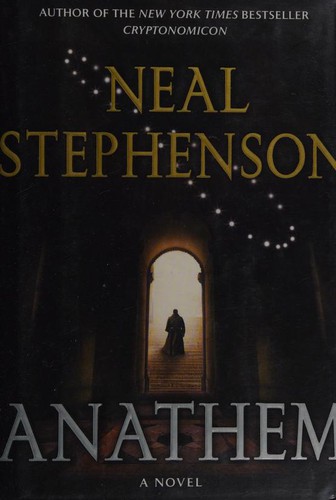Doc Kinne reviewed Anathem by Neal Stephenson
Review of 'Anathem' on 'Goodreads'
5 stars
I need to preface this review by saying up front that Anathem is one of the top five stories of my life.
Like any good story Anathem is read on multiple levels. On one level it is the story of a society that has, for reasons that become evident, cloistered their scientists, and how that world reacts and deals with its First Contact event. As such Anathem is part Canticle for Liebowitz, part Name of the Rose, part Contact, and part a mathematics and M-Theory (I prefer the word "philosophy" until perhaps the events in this book happen to us...be careful what you wish for!) introduction.
While this is not a book for the average reader, I think, its not a book that is beyond those of us who did well in the High School sciences and maths. If remembering the Pythagorean Theorem scares you, if you have no idea what Phase Space is and don't want to know, and think you would find a scene where the realistic effects of orbital mechanics sounds boring, this is not the book for you. However, if you have a bit of a scientific bent, if you're curious in looking at the world in a very new way, and you're not afraid to work at it just a bit, Anathem will give you something that no other book has come close to ever offering!
As in any good story, Stephenson, especially as the book goes on, begins to explore questions - never quite offering either us or his characters answers, just explorations - of issues that are very relevant to us here and now in the United States and the rest of the developed world.
Is religion more trouble, and more dangerous, than its worth?
How can and should technology be regulated?
Who should advise local, national, and world leaders in the blatantly technological world we are a part of? Are politicians even qualified to make decisions in our world?
In making up this new world and this new culture Stephenson uses the mechanic of "made up words" to create a difference in between the worlds. This throws some people off. Don't let it. Go with it and the terms will take on a life of their own. Hell, in some cases Stephenson found better terms for things. Don't be surprised if I start calling cell phones, jeejaws!
In the end Stephenson creates a new world, ever bit as detailed as any other such as Pern or Middle Earth, and uses it effectively as a basis for sociological exploration, combining it with a reasonably realistic (insofar as what actually happens) First Contact story as background, and gives us an ending both hopeful and satisfying. Read it.
"...and so here is where I draw a line across the leaf and call it the end."

